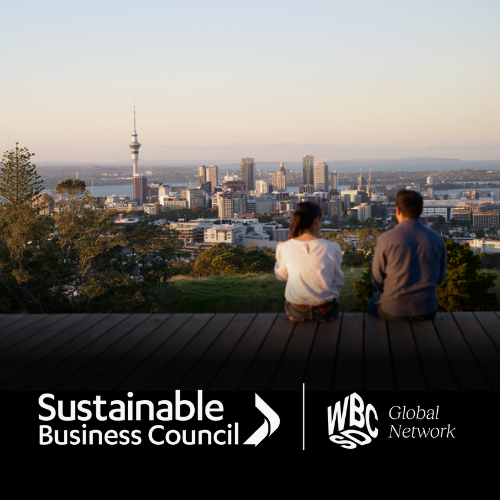In the latest out of Glasgow for SBC and Climate Leaders Coalition members, New Zealand journalist Rod Oram shares the latest insights from talks and negotiations, including carbon markets and ambition loops, taking place at the COP26 – UN Climate Change Conference.
Transcript
Kia ora tatou and greetings from the COP26 climate negotiations in Glasgow. If this set-up looks slightly unconventional it is, because it’s very difficult to find quiet places amidst all the hurly-burly of COP26. So if you’re hearing extraneous noise, or are curious about the background, my apologies for that but it’s just all part of the rich experience of being here.
There was certainly plenty of political action during this past week of negotiations here and the pace will intensify greatly this week as COP26 heads to its closing deadline of midnight this coming Friday. Politicians have two very big challenges to meet in come days – first to secure more, bigger climate commitments from countries so that we can keep the rising global temperatures to 1.5 degrees centigrade. As of now, we were at 1.7 degrees centigrade at the start of the negotiations and 1.8 at the end of this past week, so that was progress that took us halfway there, between 2.1 and 1.5. Secondly, to finally approve the overall rulebook to operationalise the 2015 Paris Agreement, even after 6 years of negotiations there are still some major sticking points, such as how to secure transparency and discipline in carbon markets, both domestic and international, and regulatory and voluntary. And at the end of this clip you’ll hear about that from Sustainable Business Member Dave Rouse, who’s here for COP26, and I’ll be talking to him directly.
That’s a key one for New Zealand, that rule book, since our government is planning large purchases of international offsets to meet our 20130 climate pledge, because it doesn’t believe we’ll make sufficient reduction in our domestic economy. So that dilemma presents a very fantastic climate opportunity for NZ businesses, and that’s to devise and commit to boldly transforming your businesses so you can sharply cut your emissions and thrive in this very fast evolving low carbon economy. Then you’ll persuade the government to invest in you and your sector and the NZ economy, rather than buying those offsets overseas. That high level of climate ambition is evident in a rapidly-increasing number of businesses globally and that’s a central feature of COP26. It’s a mutually-reinforcing feedback loop says Nigel Topping, the UK businessman who is co-leader of the United Nations Race to Zero.
Business is encouraging governments to set bolder climate targets and then together they devise faster and deeper decarbonising strategies for sectors and for businesses and thus governments are more willing to step up for financial support for that work. This is very evident, especially in the investment sector, so the Glasgow Financial Alliance for Net Zero, called GFANZ, has secured US$130 trillion of commitments to sustainable investing, which represents about 40% of that held by fund managers globally. Now, there are lots of ifs buts and ands around that, but it’s still a very important benchmark to achieve. That’s indeed a very big pot of money, and it comes with a lot of new plumbing to put the money to work, such as a raft of new sustainable finance mechanisms and regulatory processes.
This past week has seen two excellent examples of this at home in NZ, with Westpac Sustainability Link Loans to our largest corporate farmer, and Genesis Energy both of which loans set new benchmarks in this new area of finance. This big shift globally is involving companies of all scale, from the very largest to the smallest, and that’s very well demonstrated by business delegations and programmes here. One NZ example is CarbonClick which I mentioned earlier, indeed an SBC member which offers an app-based service that allows consumers to easily offset the carbon emissions from their products they purchase, and offset with high integrity, high quality loans. Dave Rouse, CarbonClick’s chief executive, is here at COP26 to contribute to those negotiations for the rulebook on carbon markets and to build relationships in the sector. As you’ll hear in the chat I had with him yesterday in the Green Zone, one of the meeting areas at COP26, where businesses are demonstrating their big contributions to decarbonising our economies.
I look forward to being back with you later this week to bring you further business insights from this remarkable hui of humanity. In the meantime, ma te wa.

